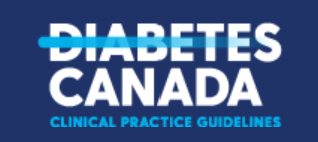The concept of remission of type 2 diabetes has become a very hot topic amongst health care providers and patients alike. People I see with type 2 diabetes will often tell me that they wish that they could treat their diabetes and have it go away, and health care providers want to know if this is a realistic or appropriate concept to discuss with their patients.
At the recent Diabetes Canada conference, a new Canadian Clinical Practice Guidelines chapter on diabetes remission was unveiled.
In addition to the now-accepted standard of diabetes remission (as blogged recently) being defined as an A1C <6% after 3 months without any glucose lowering medications, the Guidelines also introduce a definition of remission to prediabetes (A1C 6.0-6.4%) with the same criteria.
The guidelines suggest consideration of remission of diabetes as an option for people with:
- early type 2 diabetes (6 years or less) with overweight or obesity, who are ‘able or inclined’ to lose weight
- without significant eating disorders or mental health disorders (reason: these were often exclusions from the referenced studies, presumably because these issues can present challenges in adhering to strategies to achieve diabetes remission long term. I would suggest that this should be interpreted/assessed very carefully and perhaps should not be categorical.)
- without cardiovascular disease, heart failure, or chronic kidney disease (because GLP1 receptor agonists and/or SGLT2 inhibitors should be continued even if sugars are normal, for heart and kidney protection)
The Guidelines point out that losing at least 15kg (33lb) gives the best chance of achieving remission (see my recent blog on whether we should have weight loss targets for diabetes remission here). They go on to say that remission is more likely for people:
- diagnosed with diabetes for a shorter time (6 years or less – this exact duration being based on specific clinical trial data; I would suggest that clinicians do not necessarily need to consider this as a hard cutoff)
- with overweight or obesity, who are ‘able or inclined’ to lose weight
- with blood sugars that are not that elevated
- who do not take insulin (as the need for insulin may indicate a more tired pancreas)
The Guidelines recommend three options to potentially induce type 2 diabetes remission:
- bariatric surgery (for people with BMI ≥35)
- low calorie diets (800-850 cal/day) with meal replacement products for 3-5 months aimed at achieving >15kg (33lb) weight loss, followed by a structured food reintroduction program and increased physical activity (for people with BMI 27-45)
- exercise training (240-420 min/week) with a calorie restricted diet (for people with BMI >25, and with a lower level of evidence for this option)
Authors also looked at medication strategies and digital technologies for diabetes remission, but did not find a high enough level of evidence (per their predefined criteria) to generate any recommendations for these strategies.
For bariatric surgery, authors point out that follow-up studies suggest that at least 35% to 50% of people who initially achieve diabetes remission eventually relapse. The median time to remission after gastric bypass surgery is about 8 years, and relapse rates may be a little higher with sleeve gastrectomy than with gastric bypass.
The Guidelines chapter, and accompanying User’s Guide, point out some very important caveats:
- Remission may not be a reality for many people with type 2 diabetes.
- Weight loss is not feasible or achievable for many people with lifestyle therapy.
- Remission is a journey, not a destination, and authors very appropriately caution against a ‘success/failure’ approach to diabetes remission. There is potential negative mental health impact to a person who doesn’t achieve or sustain diabetes remission, as they may feel as though they have failed. Remember: people who improve their sugars and/or weight but don’t get to diabetes remission are still achieving important health improvements, and this too is a success!
- Remission is often temporary; relapse rates are high. It is recommended to check for relapse of diabetes at least every 6 months.
- The long term benefits of remission are currently unknown. No randomized controlled clinical trials have evaluated the association of type 2 diabetes remission on longer term outcomes, such as cardiovascular events, kidney failure or mortality.
- The approach to blood pressure lowering and cholesterol medications should remain consistent through the journey of a person with type 2 diabetes (with or without remission).
I would also point out that both bariatric surgery, and a highly structured lifestyle program with meal replacements may not be accessible for many people.
There is a ‘Shared Decision Making Checklist’ in the User’s Guide, to aid discussion between patients and their health care providers as to whether diabetes remission is an appropriate goal for that person.
A group of patients that I am concerned are left in an unclear area in these guidelines, is the person without cardiovascular disease, heart failure, or chronic kidney disease who is benefitting from GLP1 receptor agonists as an obesity treatment. Two GLP1 receptor agonists (liraglutide (Saxenda) and semaglutide (Wegovy) ) are now approved for weight management in people who do OR do not have diabetes. While there are no recommendations in the guidelines for strategies of using diabetes medications to put diabetes into remission (due to lack of evidence), diabetes remission using any treatment approach by defintion requires that all glucose lowering medications are stopped. The authors comment that it is unclear whether certain medications may offer advantages above and beyond optimized A1C . As per our 2022 Obesity Canada Clinical Practice Guidelines Pharmacotherapy chapter, studies consistently demonstrate weight regain when treatment is stopped. There are clear health benefits to successful weight management, and I would recommend that a person who is benefitting from the weight management aspects of GLP1 receptor agonist therapy should continue treatment.
Regarding SGLT2 inhibitors, we know that these can both treat and prevent heart failure in people with type 2 diabetes. Heart failure often goes undiagnosed in people with type 2 diabetes. In people with type 2 diabetes with high cardiovascular risk (but no known cardiovascular disease), the cardiovascular outcome studies have taught us that SGLT2i reduce the risk of hospitalization for heart failure. I think we need to give a lot of thought as to whether deprescribing this class of medications in such patients may be taking away the heart failure prevention/protection that this group of medications provides.
I am very grateful to Diabetes Canada for taking on the difficult topic of diabetes remission, and for giving patients and their health care providers extensive information and helpful guidance on how to approach this extremely complex topic. There is still much to research and learn about diabetes remission, and we look forward to learning more through ongoing and future clinical trials. These guidelines have also provided an important fulcrum for discussion and debate around diabetes remission in the global diabetes community!
Disclaimer: I receive honoraria as a continuing medical education speaker and consultant from the makers of GLP1 receptor agonists and SGLT2 inhibitors. I am/have been an investigator in clinical trials of GLP1 receptor agonists and SGLT2 inhibitors.
Check me out on twitter! @drsuepedersen
Share this blog post using your favorite social media link below!
www.drsue.ca © 2022












